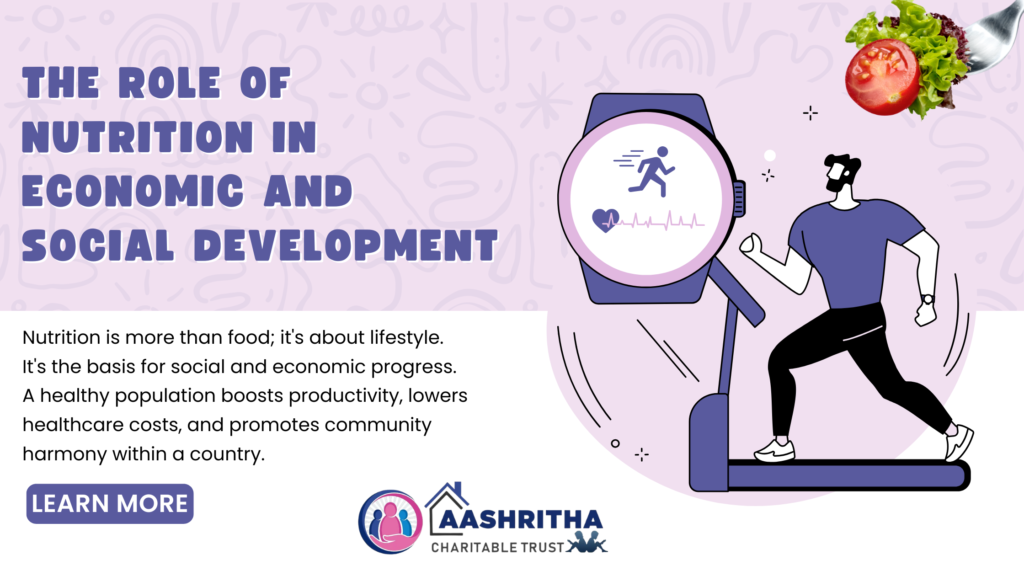Nutrition is fundamental to human health and development in societies. It has a direct effect on individual health along with the social fabric of a country. Malnutrition (undernutrition, obesity), or micronutrient deficiencies can seriously impact productivity, social cohesion and healthcare systems. In turn, proper and balanced nutrition promotes the physical and cognitive development necessary for economic and social progress.
Let’s discuss how nutrition influences economic and social development, the challenges of malnutrition, and how better nutrition can transform communities and nations.
How Nutrition Impacts Economic Development?
Nutrition directly impacts the economic performance of individuals, businesses and nations. Here’s how:
1. Improves Workforce Productivity
Well-nourished individuals are more productive, physically able and mentally alert. Malnutrition, particularly in early childhood, causes stunted development and cognitive impairments, lowering the possibility of future workers.
For example: Countries with high levels of malnutrition tend to have slower growth because of an underproductive workforce.
Impact: Better nutrition increases individual earning potential and national GDP.
2. Lowers Healthcare Costs
Bad nutrition raises the risk of anaemia, diabetes and heart disease and burdens healthcare systems. Improved nutrition may lead to reductions in health expenditures and allocation to other development areas.
For example: Early intervention for malnutrition can prevent chronic diseases and reduce long-term medical costs.
3. Supports Education Outcomes
Nutrition influences cognitive development and academic performance. Malnourished children usually have poor achievement in school and limited career options.
For example: School Meal programs like India’s Mid-Day Meal Scheme have increased enrollment, attendance and academic performance in underprivileged communities.
Impact: Well-educated populations foster economic innovation and productivity.
4. Increases Agricultural Productivity
Good nutrition helps agricultural workers who have physically demanding jobs. Additionally, it encourages sustainable farming by allowing farmers to make much better choices regarding crop cultivation and control.
Impact: Healthy farmers produce higher yields and provide food for their communities.
How Nutrition Impacts Social Development?
Nutrition impacts beyond economics on social cohesion and equality.
1. Reduces Poverty and Inequality
Proper nutrition ends the cycle of poverty by enhancing health, productivity and earning potential. Families with better nutrition can invest in education, health care and future opportunities, reducing generational gaps. Nutritional interventions in vulnerable populations may reduce the gap between the poor and the rich.
2. Empowers Women & Girls
Malnutrition affects mainly women and girls during pregnancy and adolescence. Meeting nutritional needs enables women to be engaged in the workforce and society. Programs providing maternal mortality and infant health with iron and folic acid supplements to pregnant women. Empowered women contribute to family welfare, economic growth and community leadership.
3. Stabilises Social Cohesion
Communities that have access to wholesome food have less conflict over resources and fewer health disparities. Good nutrition promotes stability, cooperation and shared prosperity. Better nutrition will promote harmony and lessen social tensions in societies.
4. Promotes Intergenerational Development
Nutrition affects individuals and future generations. Mothers with adequate nutrition during pregnancy have healthy babies with fewer infant deaths and developmental delays. Initiatives such as the Integrated Child Development Services (ICDS) in India ensure maternal and child nutrition for long-term health and social development.
Challenges for Nutritional Security
Even with its importance, nutrition security remains an issue in many countries. Key obstacles include:
- Poverty: Many low-income families lack access to healthy food, instead choosing cheap, calorie-packed options that lack nutrients.
- Food Insecurity: Food insecurity impacts healthful food provision due to unstable food supply chains, climate change and conflict.
- Lack of Awareness: Nobody is aware of the value of balanced nutrition and its long-lasting effects on development and health.
- Micronutrient Deficiencies: Secret hunger resulting from deficiencies in minerals and vitamins (iron, iodine, vitamin A) is a serious problem, especially in developing countries.
Strategies for Better Nutrition for Economic and Social Development
Governments must provide affordable, nourishing food for everyone. Subsidies for healthy foods and supplementation of staple crops with nutrients can make a difference. In most countries, iron supplementation of rice with iron and wheat with folic acid has succeeded in minimising micronutrient deficiencies.
The provision of nutritious meals in schools aims at providing more than one balanced meal each day to boost the physical wellness and academic performance of children. School lunch programs in nations like India, Brazil and the USA were successful in fighting childhood malnutrition.
Nutrition during pregnancy and the very first 2 years of life (the “first 1,000 days”) is essential for stunting long-term development and prevention. Programmes like UNICEF’s Nutrition for Growth aim to improve maternal and child health worldwide.
Community-based initiatives involving local leaders, NGOs and healthcare workers may raise awareness of nutrition and promote healthy habits. Innovative solutions such as mobile apps and data analytics can monitor nutritional programs, measure progress and deliver targeted interventions to vulnerable populations.
Support Nutrition Initiatives with Aashritha Charitable Trust
Nutrition is more than food; it’s about lifestyle. It’s the basis for social and economic progress. A healthy population boosts productivity, lowers healthcare costs, and promotes community harmony within a country. In its place, malnutrition perpetuates poverty, inequality and stagnation.
An investment in nutrition is therefore among the best ways to ensure sustainable development. Governments, individuals and organisations must create policies, programs and awareness that promote nutrition for all. Resolving malnutrition will promote healthier, richer societies for future generations.
Your contribution to Aashritha Charitable Trust can fight malnutrition and build healthier children, women and families. Together we can ensure food and resources to those in need. Donate today to make a positive change & help create a healthier and more equitable world!
Also read: Difference Between Disguised Unemployment and Seasonal Unemployment





